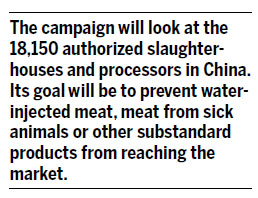|
|||||||||||
BEIJING - China is vowing to eliminate substandard meat processing in the country within the next few months as part of a campaign to ensure food is safe, officials said on Friday.
"Some small and medium-sized slaughterhouses and processors that have the proper authorization now fail to meet the standards for meat processing, and that has raised great potential risks for the country's meat supply," Jiang Zengwei, deputy minister of commerce, said at a news conference held by nine government departments, including the Ministry of Commerce, the Ministry of Agriculture and the Ministry of Environmental Protection.
The departments will begin a four-month campaign in March to improve standards at plants where pigs are slaughtered and processed. They will work to ensure the conditions at such places are sanitary, that proper quarantine measures are being taken and that the environment is being protected.
The campaign will look at the 18,150 authorized slaughterhouses and processors in China. Its goal will be to prevent water-injected meat, meat from sick animals or other substandard products from reaching the market, he said.
|
 |
Jiang called on the ministry's local branches to use the campaign to clean up substandard slaughterhouses and processors, saying "they are the biggest obstacles to ensuring the safety of meat".
Meat slaughtering and processing that has not received official approvals is illegal in China, the only exception being that rural residents are allowed to slaughter their own livestock.
Pork makes up more than 60 percent of the meat the Chinese eat every year, according to official figures.
Many in the public became concerned about meat safety after reports came out alleging that the illegal feed additive clenbuterol had been used by farmers in Henan province in March 2011.
Clenbuterol, better known as "lean meat powder", can cause pigs to build muscle and burn fat faster, resulting in leaner pork.
The drug can cause dizziness and heart palpitations among people who eat meat that has been treated with it, and China prohibits its use as an additive in pigs feed.
The growth of the slaughtering industry, meanwhile, has led to environmental pollution.
To meet the demand for meat in 2011, about 210 million pigs were slaughtered, producing 100 million tons of wastewater along the way, Li Ganjie, deputy minister of environmental protection, said at the conference.
"Starting this year, the ministry will use its website to blacklist slaughterhouses and processors that have been found to be violating the law, and it will also regulate the approval of new slaughterhouses in the future," Jiang said.
Liang Haoyi, a senior researcher at the China Animal Agriculture Association, said on Friday that the pig-farming and meat-slaughtering industries in China must ever contend with greater and greater obstacles as they try to protect the public's health.
"Government authorities should take measures to prevent sick animals from being sold for slaughter," he said. "And there is a need for harsher punishment to be imposed on those who trade sick animals."
Hot Topics
Kim Jong-il, Mengniu, train crash probe, Vaclav Havel, New Year, coast guard death, Internet security, Mekong River, Strait of Hormuz, economic work conference
Editor's Picks

|

|

|

|

|

|







